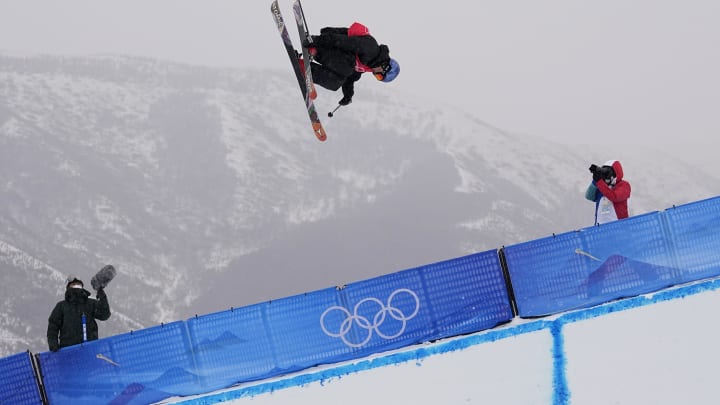Ski Halfpipe Medalists Can’t Forget the Journey to Victory, ‘Gnarly’ Conditions and All

ZHANGJIAKOU, China — On the final day of competition at Genting Snow Park, in the final freestyle skiing event of the 2022 Winter Olympics, Mother Nature brought all she could muster. She brought winds that slapped your cheeks and swirled fake powder like rising smoke. She brought subzero temperatures that tightened throats, froze toes and left even the hardiest of athletes shivering. And yet out of these conditions also came the warming sensation of joy.
“I’m just excited,” bronze medalist Alex Ferreira said. “I’m just super happy.”
“It feels amazing,” silver medalist David Wise said.
“I’m in a bit of disbelief right now,” gold medalist Nico Porteous said.
There was joy in Ferreira describing his nine-month road back from neck surgery and how the “gut-wrenching pain” that once defined his life turned into his second straight men’s halfpipe medal. There was joy in Wise, the two-time defending champion, posing for pictures with cutout headshots of his wife and two kids at the bottom of the course before sharing how he, Ferreira and fellow U.S. skier Birk Irving kept each other company all week with video games, massage appointments and other activities as part of what they dubbed the “Good Vibes Crew.”
And there was absolute joy in Porteous—representing a country, New Zealand, which arrived in Beijing with three winter medals and will soon leave with six—watching his teammates and coaches perform a ceremonial haka in celebration of its second gold at these Games. “It’s crazy, isn’t it?” Porteous said later. “Four years ago, if you told me this was going to happen, I wouldn’t have believed you. … We’re a small, humble little country. We stick to our roots, we work hard and we have amazing facilities to train on. I’d say that’s what makes us who we are.”
Make no mistake: The conditions were brutal. A small coat of real snow blanketed the bottom of the pipe this morning, and the whipping winds forced many to rethink the complexity of their runs. “It was pretty gnarly,” said Great Britain’s Gus Kenworthy, who finished eighth. “You see people waiting at the top, looking for a moment where it doesn’t really look windy. But then unfortunately, the way it works, you drop and it ends up not being a very good time to go.”
Added Wise, “We’re used to competing in the snow and the wind, but it was exceptionally cold and exceptionally windy today, and that’s kind of what defined the competition.”
Well, that and the fearlessness of the 2018 bronze medalist Porteous, who pulled off back-to-back double cork 1620s—a trick he invented and has subsequently inspired many opponents to emulate—on his 93-point first run. “Today’s my coldest day of the season by far,” said Porteous, whose brother Miguel wound up 11th. “I think it’s minus-33 [Celsius] (minus-27°F) with wind chill, so it’s a constant uphill battle to keep your legs warm and keep your body warm, because there’s nothing worse than dropping into a run with cold muscles and not feeling sharp.”
Sharp enough would also more than suffice for Wise and Ferreira, both of whom put up their medal scores in their first of three runs like Porteous.
“Being on the podium with such tough conditions,” Ferreira said. “I honestly feel like I got the gold.”
But let us give the last word to Wise, the 31-year-old grizzled veteran of the freeski circuit and, until Porteous unseated him Saturday morning, the only men’s halfpiper to win Olympic gold after the event was introduced to the Games in 2014. As he was overheard saying at the end of his mixed-zone interview, (presumably) heading to the drug testing tent: “Let’s go pee in a cup and warm up.”
More Winter Olympics Coverage:
